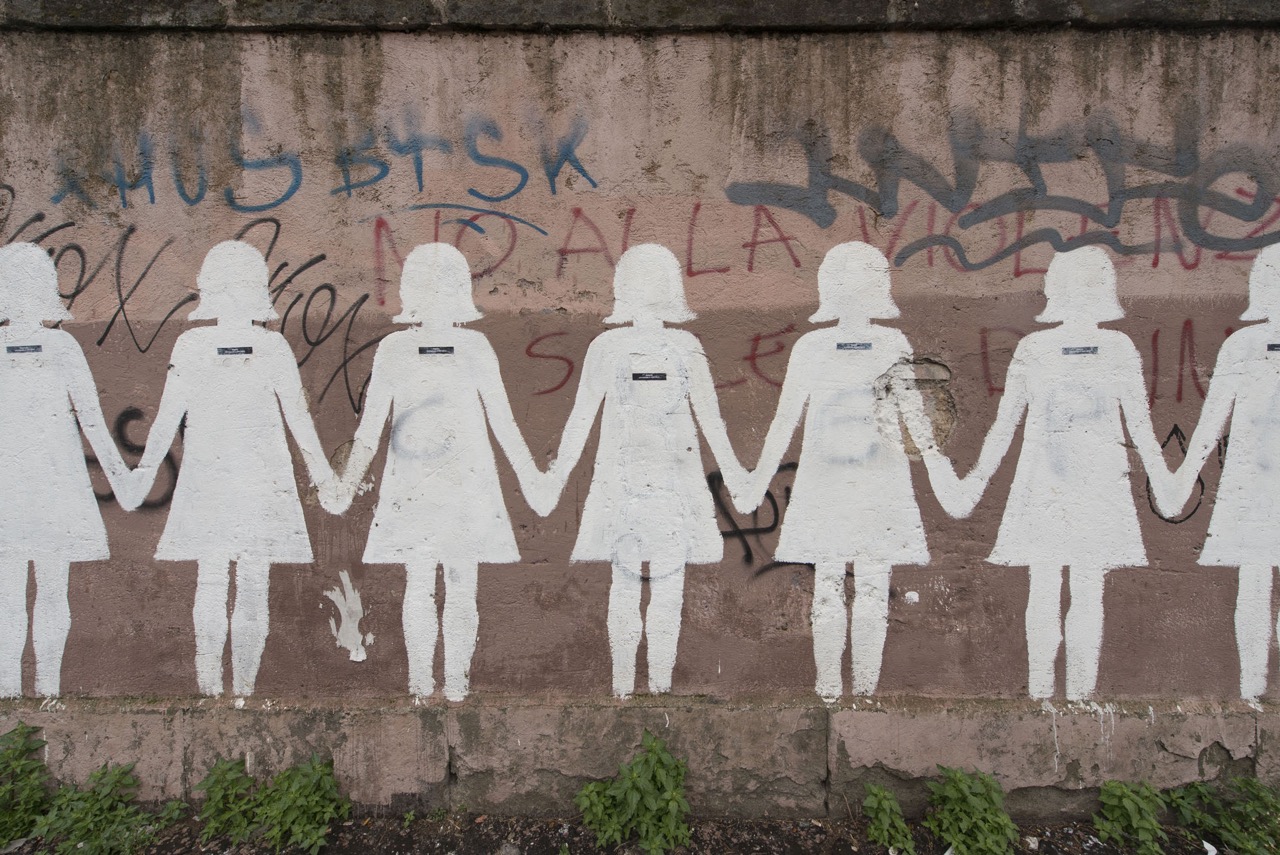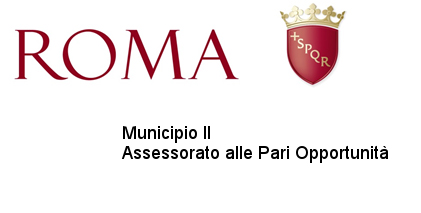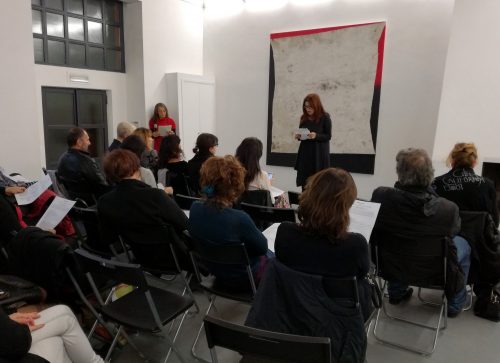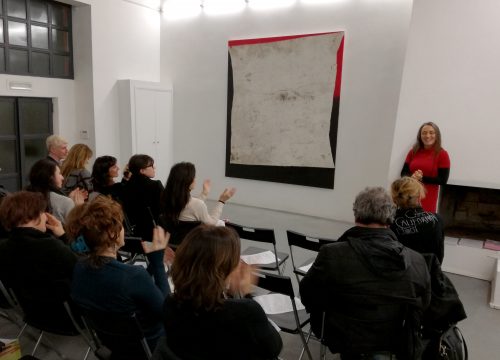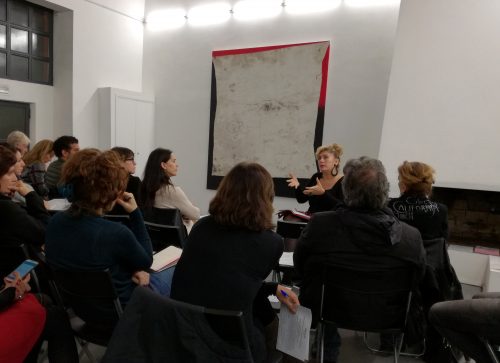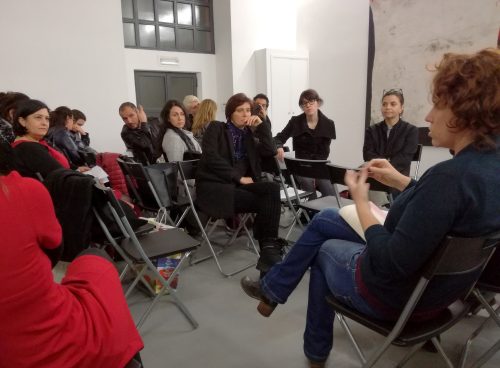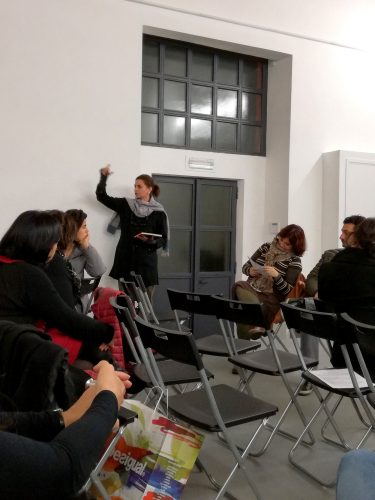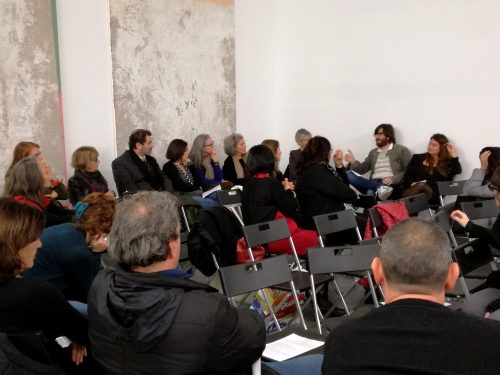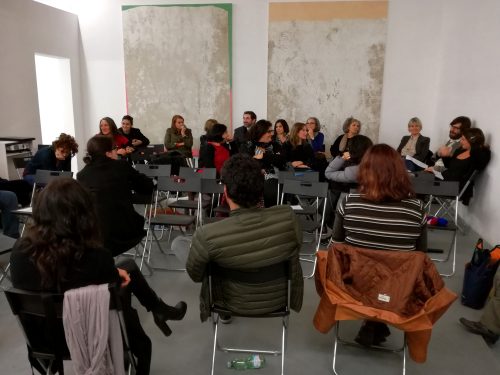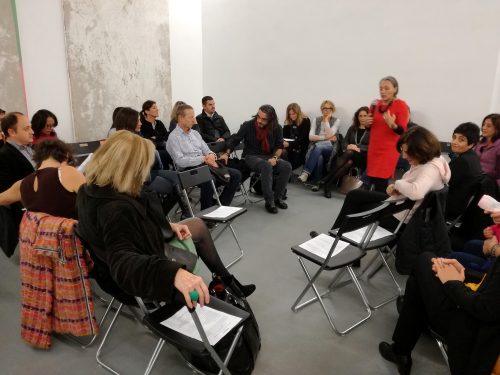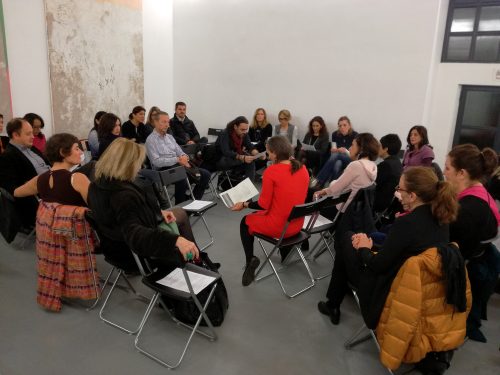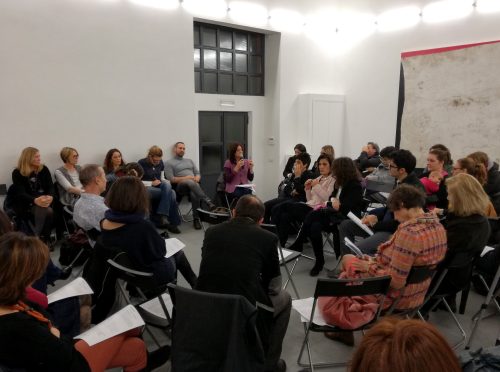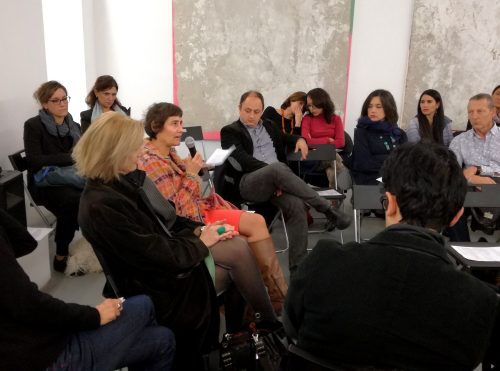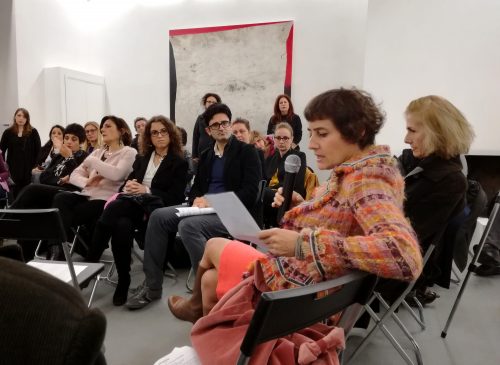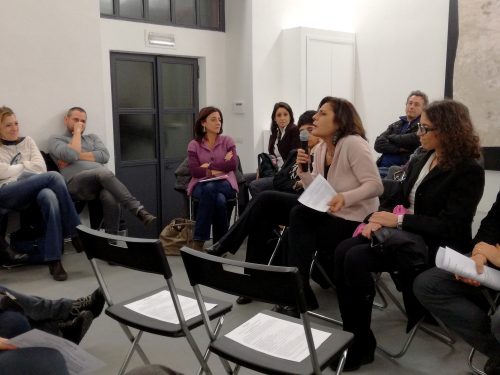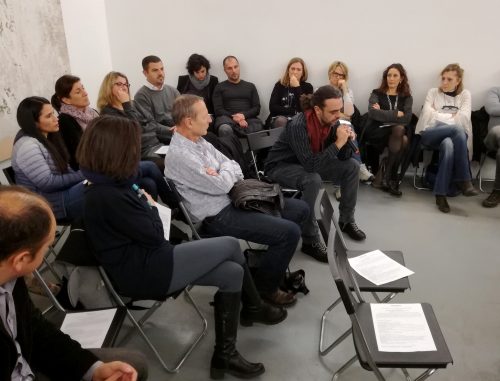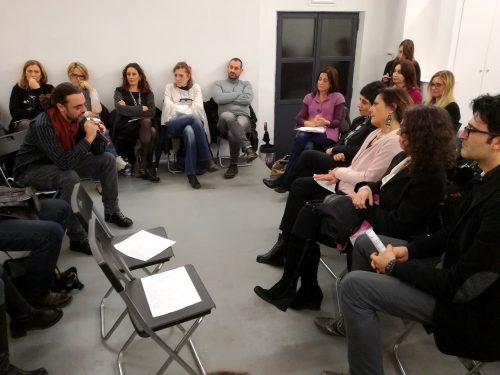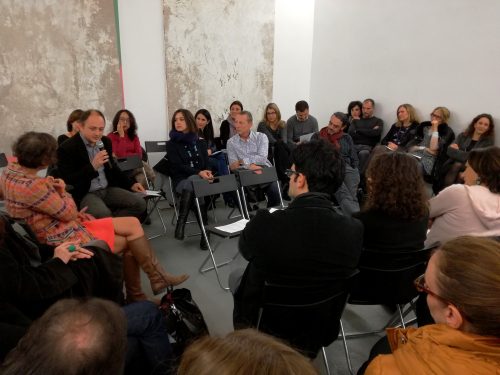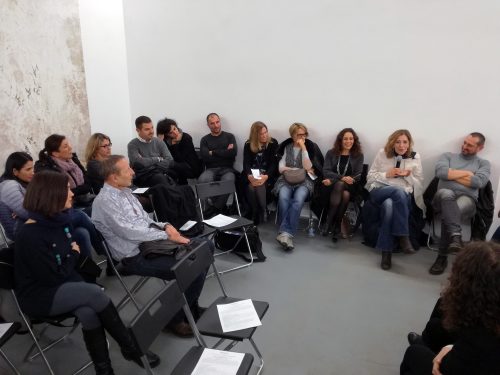Albumarte presents
Donne (non più) anonime| confronto sul femminicidio
(No longer) Anonymous women | a confrontation on femicide
Curated by Daniela Trincia
AlbumArte,Thursday 24 and Saturday 26 November 2016 at 7:00pm
Two opportunities for thought and discussion among professionals who, through their work experience, will reflect on one of the most horrible tragedy of our century: femicide.
Speakers: Sara Allegrucci, Andrea Bernetti, Luisa Betti, Caterina Boccardi, Matteo Bolognese, Teresa Dattilo, Giuseppe Esposito, Ursula Franco, Silvia Giambrone, Giacomo Grifoni, Francesca Guerisoli, Maria Francesca Palermo, Flavia Posabella, Clara Tosi Pamphili
The project was developed with the patronage of Assessorato alle Pari Opportunità – Municipio II of Roma Capitale.
Despite the resistance of a large part of the society (including many of those who administer countries) in recognizing its reality and the same use of the term, femicide exists and, without any fear, it can be called a plague.
Everyone then, for a number of reasons such as indifference, inability or morality, would more or less recognize its persistence.
The result though does not change: femicide is a reality. An ongoing reality.
Those still hiding behind other definitions, such as uxoricide, struggle to recognize that the act of violence is perpetrated by a man against a woman precisely because she is a woman, it is a gender-based violence inflicted by men on women as such.
Starting from this assumption, which needs to be assimilated, digested and taken for granted, it stems the need to talk about this topic more and more frequently, in the hope that, with time and perseverance, there’ll be more information, consciousness and awareness, in order to produce a cultural change and put the basis for a shift in sentimental education.
Why the title (No longer) Anonymous Women?
Because it still happen quite often that media, in reporting the news of an episode of femicide, do not even mention the name of the murdered woman, but she is only named as a “category”, as a function, such as the social role that she has been assigned: wife, girlfriend, partner, negletting that women are human beings, repeatedly denying the dignity of a woman whose life was violently interrupted by the hand of a man, unable to process his feelings and emotions.
Because, furthermore, these women that bear traces of everyday violence on their body are often seen by others just as any other woman, with no distinguishing marks, anonymous, indeed.
These women are instead able to find support if they find the courage to speak, to trust others, and in particular those who know and share the same painful condition.
Only through identification with others and the attempt to focus on the causes, in order to correct the effect, women will no longer be anonymous, regaining the dignity deserved.
November 25 is the date indicated by United Nation as the International Day for the Elimination of Violence against Women. On that day, many events aimed at producing reflections and discussions are happening. At midnight on November 25 though, everything’s quiet again (but it is worth to mention that on November 26 this year a national demonstration #NonUnaDiMeno will take place in Rome). It is essential to talk about it even further. That’s the reason why the space of the independent cultural association and non-profit association AlbumArte, directed by Cristina Cobianchi, will host the event to talk about the topic both before and after the day,on November 24 and on November 26, at 7:00 pm, hoping that people will continue to talk about it on the 27, 28, 29 …
With the aim of opening an actual, broad discussion, both women and men that had encounters in their lives and that works in several fields related to violence against women and femicide, will join the conversation and address the topic in its most different aspects, those heterogeneous aspects of everyone’s life.
Thus a comprehensive examination, as the acts of violence agains women are manifested in many different forms that (need to say), luckily for us, do not always find their outcome in femicide, even though are equally linked to the same notion: male superiority over the female and the idea of possession. When, instead, these acts culminate in femicide, these are brutal, ruthless, gruesome acts, loaded with intense ferocity: head smashed with a hammer (Loretta Gisoni, 54, Montebello Loveno, Varese), body gutted by multible stab wounds (Elisa Pavarani, 39, Parma), sprinkled with petrol and burned alive (Sara di Pietrantonio, 22, Rome). When, however, they survive the brutality of men, as in the case of Chiara Monda Insidioso, 19, Rome, who was reduced to a minimally conscious state by the kicks and punches of her boyfriend, their life is completely torn apart.
We need to talk about it to understand that it is not a suddent act, not a fit, not a blinding burst of anger or passion. Crime of passion is in fact the most widely used oxymoron: just as if there can be any passion in a crime, and the killer is someone “caught by a fit of jealousy, he lost his mind, he was mad with rage”, as from many newspaper articles, he doesn’t certainly do it for love, yet because he can’t conceive the woman outside of the function he assigned her.
Some are also trying to translate these acts as a pathology, creating a perfect alibi to avoid analysis and reflection on the cultural origins of violence agains women, frequently originating from the inability to manage feelings and to accept abandonment, resulting from a rooted culture of possession and abuse. Likewise, a certain degree of victim’s fault is often suggested in the chronicle of a story (she wanted to leave him, she wanted divorce), that, in some respects, would absolve the killer. It is therefore suggested that we must start from the use of language, of terminology, both verbal and especially nonverbal: language articulates thoughts, and thoughts affect behavior and attitudes, breaking down cliché and stereotypes.
We need to talk about it to stop ascribing violences to age, census or the belonging to subaltern areas, or education. Even a quick simple research online would show that abuses and murders have no relation to age, social status, location or category: anybody can be a potential abuser or a murderer, from the doctor to the lawyer, from the security guard to the broker, in a big city as in a small village, in the south as in the north, a twenty year old as a seventy.
We need to talk about it because abusers and murderers are (in most cases) the expression of non-accepting the end of a love relationship: it is almost always the case that the victim is the one breaking up with the murderer. At the same time, a hard distorted cultural factor has to be dismantled, close to the notion of male privilege (Pierre Bourdieu), and every man feels the need to affirm that constantly.
We need to talk about it to shed a light on some of those aspects related to femicide that are often omitted, such as the victims of witnessing violence, that is, those victims forced to witness the violence on their mother, and orphan children witnessing killings of their mothers by the father or another man, sometimes even fatherless if the latter commited suicide after the act of violence, or even motherless with the other parent in prison.
As of today, there are over 1600 orphans victims of femicide.
We need to talk about it because it is more and more clear that information campaings are not longer sufficient. The combination of causes are individual as much as they are social. For that reason, while the help of family is important, it is even more fundamental to have support from institutions that contribute to education (even sentimental) and to a better individual satisfaction in relation to self-esteem and personal affirmation.
We need to talk about it because it is only by leaving the private dimension that we could generate a cohesive and active community that, through joint actions and large daily commitment, would be able to grow sensitivity as well as that socio-political and cultural change needed to defeat the structural plague of femicide.
Daniela Trincia
* Image | Gruppo di donne, Murale, 2012 – via dei Sardi, Rome. facebook.com/muralecontroilfemminicidio. Photo by Giorgio Benni
_______________________________________________________________
PROGRAMME OF THE DAYS
Thursday 24 November 2016 | on comunication
Welcome Cristina Cobianchi and presentation Daniela Trincia
Luisa Betti, Journalist: The story of femicide.
Francesca Guerisoli, Art Historian: Art and femicide: notes from the Seventies to the present day
Silvia Giambrone, Artist: Men’s language of violence.
Clara Tosi Pamphili, Fashion Historian: The image of women in the fashion industry as a site of body’s representation.
Caterina Boccardi, Writer and Actress: “And so?!”: a dramatic episode. What drives a woman who suffered psychological abuse.
Sara Allegrucci/Matteo Bolognese, Actors: “With eyes closed”: an introspective journey on violence. From Reality to Finction.
Maria Francesca Palermo, Criminal Lawyer: Femicide: on the necessity of calling out some killings of women as gender-based violence.
Conclusions Daniela Trincia and final greetings Cristina Cobianchi
Saturday 26 November 2016 | on violence
Welcome Cristina Cobianchi and presentation Daniela Trincia
Teresa Dattilo, Psychologist: A speech with victims of violence.
Ursula Franco, Criminologist: Femicide as a pre-announced crime.
Maria Francesca Palermo, Criminal Lawyer: Femicide: the unconsciousness of the violence experienced.
Giacomo Grifoni, Psychologist: Work together with the perpetrator of violence. An attainable challenge.
Andrea Bernetti, Psychologist:The experience of CAM. A space for change.
Giuseppe Esposito, Psychologist: The double violence against Roma women: between invisible and forgotten
Flavia Posabella, Psychologist: Violent love. Consequences on children.
Conclusions Daniela Trincia and final greetings Cristina Cobianchi
Technical Record
Donne (non più) anonime – confronto sul femminicidio
(No longer) Anonynous women – a confrontation on femicide
Curated by Daniela Trincia
Thursday 24 and Saturday 26 November 2016 at 7:00pm
Two occasion for discussion
AlbumArte, Via Flaminia 122 Rome
Info: T 063243882 E info@albumarte.org W www.albumarte.org
www.facebook.com/donnenonpiuanonime / #stopfemminicidio
________________________________________________
